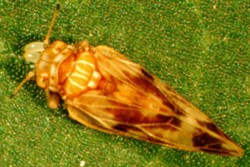 Japanese Knotweed photo courtesy of Y2U.co.uk.
Japanese Knotweed photo courtesy of Y2U.co.uk.
Most of us don’t like bugs. And if your like me, if you see one in the house, your immediate reaction is to find a slipper to kill it. Sorry to the bug lovers!
In nature though, as with all other creatures, they serve a particular useful function. Researchers at the British University of Leicester have found an insect to combat the Japanese Knotweed, a widespread invasive plant species that was inadvertently let loose upon the country a little over a century ago.
Most people in the UK are very familiar with the problem, but to get everyone else up to speed, this knotweed causes the country problems, which according to the CABI (a nonprofit with expertise in agriculture and the environment) include the following:
- Infrastructure Damage: pushing through asphalt, building foundations, and concrete retaining walls.
- Recreational Nuisance: impeding access for anglers and boaters.
- Impeding Biodiversity: crowding out native vegetation and limiting animal species diversity. CABI describes it as having “the biodiversity of concrete.”
 Aphalara itadori photo courtesy of Defra.
Aphalara itadori photo courtesy of Defra.
In a collaborative effort, UK scientific organizations are lobbying the government for permission to release what they call a highly specialist insect named Aphalara itadori into the environment.
Dick Shaw, CABI lead scientist, said, “The insect doesn’t actually eat the plants, but sucks the sap like an aphid, and also produces vast numbers of offspring on the plants, which severely affects the vigor of the plants.”
Ministers from the Defra, the UK Department for the Environment, Food, and Rural Affairs’ Food and Environment Research Agency have released a statement seeking public opinion about unleashing the insect to control the plant problem.
Advocating the position, Defra states that, “The psyllid (insect) has been tested on 87 non-target types of plants including those closely related to the Japanese Knotweed as well as ornamental plants and important crops, to determine whether it will feed on other plants. The findings suggest that only a few closely related non-native knotweeds are potential hosts in Britain.”
Expressing prudence, Shaw added that, “Since there has never been a release of a biocontrol agent for a plant species in Europe, extreme caution is being exercised by all concerned. The organism has now satisfied the scientific community that the proposed release would be both safe and beneficial to the environment.”
Should all go the way the scientists hope, after the public comment period, if “there is a satisfactory conclusion to the process,” the insects are expected to be released into the environment in April 2010, according to information from the University of Leicester. Defra is the authority that would approve the release of the insects under the Wildlife and Countryside Act of 1981.
All parties are pushing this measure for both environmental health and economic reasons. Defra released a statement saying that the government is considering the measure as a means of “reducing the use of chemicals and the cost of controls like weed killers and physical removal, adding that, “The cost of eradication nationally using conventional methods was estimated at £1.56 billion in 2003.”
Reader commentary and input is always welcomed!